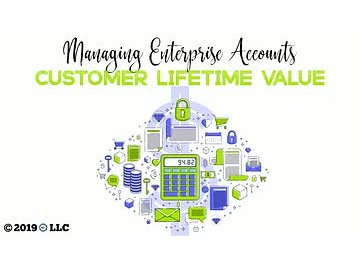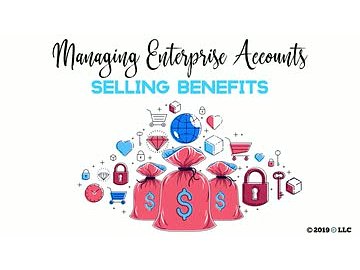Territory Management: Managing a New Territory
Perhaps your company has expanded into a new market. Or, you're acquiring someone else's territory, either temporarily or permanently. Whatever the case, you're now working in new territory. Where do you start? That's what this program is about. We'll go over tips on familiarizing yourself with your new region. We'll discuss the differences between working a new territory versus an inherited territory, and how to approach these accounts. We'll also go over planning a successful training session and new sales strategies.
Territory Management: Analyzing a Territory
Yes, it's important to attack your territory and generate as many sales as possible. But it's equally as important to analyze your region on a regular basis. You need to know it inside and out, so in this course, we'll talk about the best ways to do that. We will go over understanding the geography, customer and lead data, and knowing your competition. We'll talk about SWOT analyses, coming up with a plan of attack, and setting reachable benchmarks.
Depending on what you sell, eventually you may need to take it to C-level, executive employees. It can be an intimidating task to sell to chiefs of departments or companies. How do you know when to move your sale to that level? How do you get an "in" with a chief? And what the heck do you say when you get there? That's what we'll cover in this course. We'll talk about the roles of chief leaders and how to speak at their level.
Sales Forecasting for the Salesperson
If you're a sales rep, chances are, most of your sales forecasting has been done for you. But there are several reasons why it's beneficial for you to get involved in them. In this program, we'll talk about why doing your own sales forecasting is important. We'll go over how to create a sales forecast, and discuss things you should take into account when developing one. We'll also talk about different forecasting methods to help determine which style is best for you.
Managing Enterprise Accounts: Introduction
Enterprise accounts are those key customers you can count on for bigger, more valuable sales, and a steady stream of income from consistent purchases. These are reliable clients who will stay with you long-term, so you need to take good care of these people. How you do that is what we'll be covering in this series of courses. In this first program, we'll give a brief overview of what enterprise accounts are and why they're so valuable to you and your company.
Managing Enterprise Accounts: Value Added Selling
Adding value for your customer doesn't come with discounting prices or persuading them with your sales pitch. Enterprise customers want relationships. They want partnerships. They want honest, genuine communication because buyers are well-informed, with product and service data available at their fingertips. In this course, we're going to discuss value added selling and how to stand out from the competition by offering a solution only you can provide.
Managing Enterprise Accounts: Customer Lifetime Value
As a salesperson, you're in the business of creating customers, not buyers. You want the loyalty of a long-term relationship, not a one-off purchase. One component of developing loyalty is understanding a customer's lifetime value (CLV), or, the total revenue you can expect during their entire association of doing business with you. In this program, we'll talk about how to calculate that number and why it's important. We'll discuss churn and retention rates, revenues and margins per customer, and the formulas used to determine these values.
Managing Enterprise Accounts: No Push Selling
Traditional sales techniques have fallen by the wayside as technology continues to improve, providing customers with more information and buying power. Aggressive selling doesn't have the same sway that it used to. No Push Selling takes almost the opposite approach because the idea is to serve, rather than to sell. In this course, we'll take you through the basics of this sales method, and discuss the importance of educating your customers, building relationships, and moving the process along slowly.
Managing Enterprise Accounts: Pre-Call Planning
You want to get to know your customer as well as you can before you actually meet them. That takes time, effort, and knowing how to do your homework. In this course, we'll talk about where to look to track down pre-call customer data. This includes utilizing your CRM and researching customers online. We'll also go over determining your objectives for the call, creating a call agenda, and knowing who to include on calls.
Managing Enterprise Accounts: The Five-Minute Debrief
You've just had a meeting or call. Now you need to debrief. This often seems like a step you can skip to save time. "Oh, I'll remember what happened." Or, "I'll write down the details as soon as I get home." But each minute that passes, an important piece of the conversation gets lost. So let's talk about the five-minute debrief and what you need to ask yourself in order to get the most value out of it. Doing this will help you learn what do avoid and what to employ on future calls.
Managing Enterprise Accounts: Finding Unmet Needs
You can't force a customer to want what you're selling. You can't charm them into having a need for your product. You have to first determine their needs, and see if your product or service provides a solution for them. Establishing their needs can be difficult, so let's talk through some ways to do it. In this course, we'll go over great questions to ask to uncover a customer's unmet needs. We'll discuss mapping your customer journey. And we'll touch on some ways to differentiate yourself from your competition.
Managing Enterprise Accounts: Selling Benefits
Selling features of your product or service won't get you very far. Selling benefits means selling solutions to your customer's unmet needs. That's the sweet spot, and that's what we'll be covering here. In this course, we'll talk about knowing the difference between features and benefits. We'll go over turning features into benefits. And we'll also talk about how to illustrate benefits.
Managing Enterprise Accounts: Handling Objections
"Now's not the right time." "We can't justify the price." "Our old product works fine." "There's no room in the budget for that." Bet you've heard one, or all, of these before. Objections are unavoidable, but they can be redirected into questions about their hesitation, opening the door for you to prove your product's value. Let's take a few minutes to go over how to handle objections, and discuss the four main types of objections to overcome.
Managing Enterprise Accounts: No Push Close
Pushing a deal past the finish line is the best feeling, but it can take time, patience, negotiations, communication, and more patience to get there. In this last program on Managing Enterprise Accounts, we talk about the final step of the sales process: the close. We'll go over how to close the sale, and some tactics you'll want to avoid. At the end of the day, if you've taken all the necessary steps, the sale should close on it's own. If they're not quite ready to buy, then you still have a bit more work to do.













